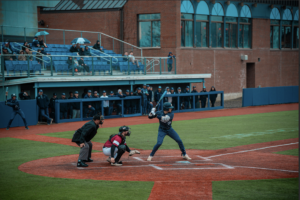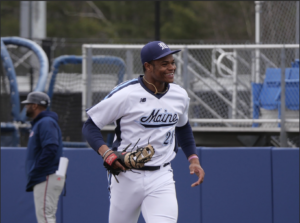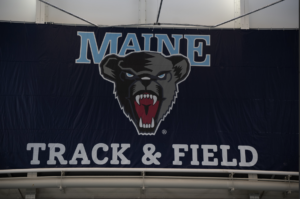Maine’s beloved ballclub is headed to the postseason for the first time since 2014.
Most fans who pack into Hadlock Field on a given summer day aren’t worried about the team’s record or their place in the standings. Many fans are tourists, while others attend games to watch potential prospects or high-profile players on their rehab assignments. Some fans are at the ballpark for a company outing or a summer camp day trip. However, there are a few fans who are extremely devoted devotees.
Passionate fans will know that the Sea Dogs have only reached the postseason eight times since their inception in 1994, and have won the Eastern League title only once in 2006. This lack of success is puzzling when you think of all the talent that has come through Portland on their way to baseball stardom. Names like Beckett, Papelbon, Pedroia, Ortiz, Lester, Betts, and Devers have all featured at Hadlock Field across multiple decades. However, the Sea Dogs themselves have been unable to find consistent success.
Midway through the 2022 season, it looked bleak for the team yet again. At the halfway point of the season, Portland sat at 30-39, fourth in the Eastern League’s Northeast division, and 14 games out of first place. Portland’s division rival and the New York Yankees’ minor league affiliate, the Somerset Patriots, held the lead. Now, against all odds, the Sea Dogs will play those very same Patriots in their first divisional series appearance in eight years, all because of a recent rule change in Minor League Baseball.
Minor League Baseball (MiLB) has often been used as a testing ground for experimental rules before they are applied at the Major League level. Sometimes, rule changes are instituted to help keep the game fresh and make for an entertaining viewing experience.
MiLB executives noticed that throughout the course of a season there is a disparity between a team’s performance and its place in the standings. Teams who performed well early on often build up large leads in the division before falling out of playoff contention when their best players are called up. Conversely, teams buried in the standings early on see an influx of prospects at the trade deadline but are too far behind to make the playoffs, leading to talented teams missing out on the postseason.
Their solution was to split the season into halves. The division leader at the halfway point automatically clinches a spot in the postseason. From there, the standings are effectively reset, and the second-half champion secures the second spot.
After starting the year with a miserable -34-run differential, this rule kept the Sea Dogs in contention, and they stayed engaged in what would have otherwise been a lost season. They burst out of the gates in the second half of the season, and went 45-24, finishing first in their division for the second half of the season. Significant contributors to the campaign included slugger Christian Koss, speedster David Hamilton and ace flamethrower Bryan Mata. Portland’s faithful were treated to a +76-run differential and a 23-13 record at home during the second-half stretch.
In terms of overall record, the Sea Dogs finished the season at 75-63, third in the Northeast division, and 2.5 games behind the second-place Hartford Yard Goats: who by this new rule, did not qualify for the postseason. Conversely, the Richmond Flying Squirrels of the Southwest Division finished at 66-71 overall but earned a playoff spot for being the division’s leaders at the end of the first half of the season.
Although most casual fans don’t understand or care about the nuances of postseason AA baseball, I’d contend that this playoff berth is important. It’s important for the longtime season ticket holders who’ve rooted for this team since their colors were teal and white. It’s important to the stadium ushers, who’ve worked at Hadlock for years to occupy their summers as retirees. It’s important to the kids who want to play on a field like Hadlock someday. And of course, it’s most important to the players themselves.
Minor League players have major dreams, and they couldn’t accomplish them without Portland. From living with host families to being cheered on after a home run, Portland has given so much to the Sea Dogs since 1994. Now, for the first time since 2014, they’re ready to give back.







